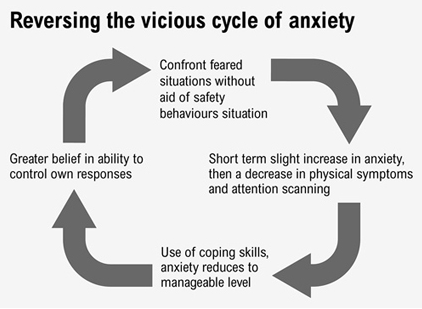
It’s important but when you’re suffering it can be overwhelming.
Anxiety is important because it essentially protects us against potential threats. It is trying to cope with a future event that you think will be negative. You do this by paying more attention to possible signs of potential threat, and looking internally to see whether you will be able to cope with that threat. When you notice your anxious symptoms, you think that you can’t cope with the situation, and therefore become more anxious. This is the start of the vicious cycle of anxiety.

How Avoidance Contributes to Anxiety
If you feel anxious, or anticipate feeling anxious, it makes sense that you will do things to reduce your anxiety. People sometimes try and reduce the anxiety by avoiding the feared situation altogether. This avoidance instantly decreases the anxiety because you have not put yourself in a distressing situation. However, while avoidance makes anxiety better in the short term you have also made the anxiety worse in the long term.
An example of this is when you avoid going to a supermarket to do the shopping because that’s where you experience fear. As a result you successfully avoid the distress you associate with supermarkets. In the short term, you do not feel anxious. However, in the long term you become even more unwilling to confront anxiety.
Your belief is that emotion is dangerous and should be avoided at all costs. You do not disconfirm your catastrophic predictions about what may happen in the shopping centre. You continuously look over your environment for signals of danger and signals of safety. In this way your anxiety may increase and generalize to other situations.

How neutralizing your anxiety, preserves it.
In addition to avoidance many people use “safety behaviours” or subtle avoidance to help cope with anxiety. These may include relying on medication, the security of your mobile phone, always having an exit plan for potentially anxious situations, or making sure you have someone else with you.
These safety behaviours also play a part in the vicious cycle of anxiety. When you become dependent on them you do not learn that emotion per se is not dangerous. You do not learn that distressing emotions tend to come down from their apex of their own accord. You try to suppress emotion, which has the contradictory effect of heightening the emotion, increasing the distress. Also can you imagine how stressing it would be if one day your safety behaviours were not available to you? This predicted catastrophe will probably increase your avoidance. Ask yourself, what do you learn in the safety of your living room? The answer may not be encouraging!
Reversing the Vicious Cycle of Anxiety Vicious cycles play an important role in maintaining anxiety. However, you can turn this cycle around to create a positive cycle that will help you overcome anxiety. One important step in this cycle is gradually confronting feared situations. This will lead to an improved sense of confidence, which will help reduce your anxiety and allow you to go into situations that are important to you.
Some people might encourage you to tackle your biggest fear first – to “jump in the deep end” and get it over and done with. However, many people prefer to take it “step by-step”. We call this “graded exposure”. You start with situations that are easier for you to handle, then work your way up to more challenging tasks. This allows you to build your confidence slowly, to use other skills you have learned, to get used to the situations, and to challenge your fears about each situational exposure exercise. By doing this in a structured and repeated way, you have a good chance of reducing your anxiety about those situations.
When the anxiety cycle is broken, it will look like this:


If you liked this article. You may be interested in some of our other articles as well. Learn more




